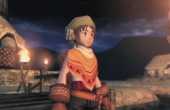Siothrún
Has an MFA in Creative Writing Fiction, and M.Phil in ELT. Former Managing Editor for Zelda Dungeon, studying psychology/mental health, and is a freelance editor and writer.
Correspondent II
- Plebian Penman
- Common Writer
- Lurker
- Pssst
- Hand Raiser
- Vocal
- Outspoken
- Sharp-Eyed Citizen
- Town Watch
- Detective Deskman
- Penman Patrol
- Strategy
- 8-bit Hero
- Article of the Month
- ?
- Articles
11 - Featured
11 - Comments
189
- Ext. Comments
106 - Processed
90 - Revisions
71
- Topics
24 - Topics Taken
4 - Notes
30
- Topics Proc.
79 - Topics Rev.
21
- Points
4674 - Rank
19 - Score
2907
Latest Articles
Latest Topics
A Perspective on Banned Books in America versus Other CountriesRecently, a lot of books have been making it onto the infamous banned books list in America, due to containing such themes as "strong female leader" in the case of Wizard of Oz, "racism", especially with children's books that tend to point to the systemic nature of racism in America, and of course, "sexuality and gender" that basically gets slapped on anything that even remotely hints at an LGBTQ relationship or gender expression outside of the cisgender spectrum. Most of these entries to the ever-growing ban list seem to be coming from conservative areas. It might be good to take a small sample of the banned book list from the past 2 years or so and see how it would compare to, say a European banned books list, if the idea of a banned books list isn't something that is wholly limited to America in the first place, and see if there are any overlapping topics between the lists to see what trends might exist cross-culturally. If this cross-examination is not possible, the topic taker could instead talk about whether or not book bans should exist, and the reasons why they do, and could choose to take a few selections from the banned books list and make an argument as to whether or not the themes presented in the literature truly merit a spot on a banned books list. Banned Books list for America: (link)
|
Storytelling in Roguelike GamesThe topic taker should explore how roguelike games can be used to tell complex stories. Specifically, the topic taker should consider The Binding of Isaac and similar games that use its roguelike mechanics, like unlocking new characters, new powers, or new stat boosters to tell a multi-layered story. For example, in The Binding of Isaac, clearing a run usually unlocks a new ending to the game, and then opens up a new path and/or character for the player to choose. As always, the topic taker is free to include other roguelike games they know of that use the game mechanics to tell a complex story in their analysis. Things to consider would be as follows: – The story gets told in various parts, in some manner, as referenced with my example above. – The roguelike offers a story in some way, so, this excludes things like Brotato, to my understanding. – The topic taker is free to add in whatever elements they might need for this article. For example, the topic taker, if focusing on The Binding of Isaac may consider looking into how the religious elements in the game tell a deeper story. Or, if the topic taker chooses to include Hades in this analysis, they could include aspects of the Greek Pantheon that highlight elements in the story and/or mechanics. – The topic taker can consider the merits of comparing and contrasting two different roguelike games to see if storytelling is similar or different between them, but, given the nature of roguelike games, I would advise limiting this article to two games. Here is a link to the Wikipedia for The Binding of Isaac for topic takers who may not be familiar with the game or its mechanics: (link) Binding of Isaac is,to OS X, and Linux.
|
Shifts in YouTube and the Rise of Short Video Media Like TikTokFollowing the departure of the creator of channels The Game Theorists, Film Theorists, Food Theorists, and Style Theorists, MatPat, from YouTube, there has been discussion about the changes of YouTube's platform and if viewers of the platform are going to see other long-standing YouTubers leave. In MatPat's goodbye video, he references other YouTubers who have decided to leave the platform and notes that "the platform is changing". We have also seen the trend of short-style videos in the vein of TikTok rise in popularity. The topic taker should address what changes they see taking place, possibly using the host of recent goodbye videos as a jumping off point, for the web-video platforms and analyze what those trends might mean for others looking to get into the content creation space. The topic taker is free to include the psychological impact of content creation, especially with the constant stream of short-form videos, has on a person. In addition, the topic taker can compare and contrast the platforms of YouTube and TikTok on multiple levels, such as monetization strategies and algorithms if they wish in order to predict where the trends might be going and indicate what those trends suggest for viewers and creators alike. MatPat's Farwell: (link) |
Analyzing Evoland: A Touching Game about the History of Games, or a Retro Gameplay NightmareEvoland I and II are games by the indie developer Shiro Games and were released in 2013 and 2015. Evoland was inspired by older games in series like Final Fantasy and Zelda, and, it somewhat takes the player through a bit of video game history in its premise. The gameplay, despite the shifts in playstyles that took place, flowed well, according to a reviewer. Evoland II definitely builds on the premise of capturing the feeling of how older games played, and has more mechanics in it than the first game. However, it could be said that there are too many mechanics that contradict and break flow. For this topic, the topic taker should look into reviews on both games to see if these games set out to capture a truly nostalgic feeling while adding their own twist to the genres the games were influenced by or if something about the older styles of gamplay simply don't mesh in the modern era of gaming. The topic taker can consider the following avenues of research for adding foundation to this analysis: – Consider the history of the video game industry and the limits of technology that affected game mechanics and graphics and whether the current technology is too good to correctly capture how older games played. – Figure out what the developer intended for their games, if possible, and if they achieved that intention. – See if there are any other games similar to Evoland that mixes up different kinds of genre and gameplay and see if they are successful or if they fall into the same problems as Evoland. – If the topic taker has played Evoland and Evoland II, they are free to add in their personal experience with how the games felt as it relates to this topic. Here are links that might help the topic taker start their research: Evoland: (link) Evoland II: (link)
|
Examine the Themes of Matrix: ResurrectionsMatrix: Resurrections released in 2021 and returned viewers to the world that was built on in the previous trilogy. The first movie, The Matrix (1999) has been confirmed by the Wachowskis to be a trans allegory on some level, and the meaning of the first trilogy is still debated. The topic taker should examine if the themes of the most recent film add something to the trilogy's discourse. Along with that, the topic taker should examine if any allegories are made within Matrix: Resurrections. Specifically, the topic taker should aim to answer the following question after their theme and allegory analysis: Does Matrix: Resurrections provide any meaning to where society finds itself with technology and the rise of AI? The topic taker is free to go into the history of the Matrix as a whole, including how it was produced to see if there are any similarities to how Resurrections was produced and if the new film took this history and the discourse surrounding the original trilogy into consideration. The topic taker can, of course, include any research on this topic that they wish. For example, if following the trans allegory of the original Matrix helps establish something that Resurrections is conveying, please include that in your analysis! Link to an interview excerpt by Lilly about The Matrix's trans allegory: (link) |
The Rise of Newsletter Subscriptions, Web Novels, and the Future of PublishingIn certain writing circles, SubStack and Ghost are popular ways of getting writers' work into a email newsletter format. These sites promise that the writer's rights remain with them, and, supposedly, revenue can be made through these sites. Ghost in particular sells itself as being a place where a writer can build up their brand. Furthermore, places like Royal Road and Wattpad are places where writers can post their work as web novels, which then might be picked up by a publisher. These places may accept donations on the writer's profile so that they can make money from their craft. The topic taker should research the following things for this topic: Does writing a web novel or posting writing on a subscription service affect the writer's process? Is this way of allowing writing to be placed out into the world good or bad–for example, does creating a web novel cause the writer to burn out? Are places like these sites using writer's aspirations for free revenue on their behalf? In other words, are these sites promising something like notoriety or a path to publishing that they cannot keep? Finally, does writing for sites like these mean that the publishing industry might be going through a change, or, are sites like these a new way of gatekeeping making money off of writing/getting work published? The topic taker can also talk about problems within traditional publishing and the toll it may take on a writer and their psychology or process of writing if they wish as well. Relevant links for research:
|
2000s Anime and its Theme of JusticeThe 2000s had quite a few anime that dealt with what it means to "become" justice, in a sense. Fate Stay Night has a protagonist who tries to fight for his sense of justice. Claymore examines the topic in a more brutal way that also deals with what it means to be human, and, of course, Death Note and Code Geass: Lelouch of the Rebellion both examine what would happen if their protagonists were given a means to end the wrongs of the world in which they live, only to pay a price for it later. The topic taker should examine each of the anime listed, if possible, and compare and contrast how each anime dealt with the theme of justice it wanted to convey. How did each anime handle the toll it took on its protagonist? What could be gleaned from the outcomes of the individual anime surrounding what it means to be a savior figure, even if that ideology is subjective? Furthermore, the topic taker should delve into whether or not the sense of justice being displayed is entirely subjective to the protagonist of the anime, or if it tackles the idea of objective justice and the toll that takes on groups as opposed to the individual. The topic taker can include other anime that they feel may fit this idea, so long as it was released between 2000-2009, as there seemed to be a trend with anime around that time that shared a certain thematic work and aesthetic which is to be examined in this topic specifically. In this regard, the topic taker could also deepen the topic by looking into what was going on in Japan and/or the world in general at the time to see if current events or recent history evoked the theme of justice being culturally relevant to its viewers. The topic taker may also include, briefly, how anime from the 2000s with this theme of justice may have influenced other anime to re-examine the themes later on, such as with 2012's Psycho-Pass or more current day anime. |
Has Achieving a Platinum Trophy or Equivalent in Games Become too Time Consuming?Most games, since the rise of the PS3 and Xbox 360, have introduced some kind of trophy system that marks completion progress. Some trophies or achievements provide some challenge, while, depending on the age of the game and if multiplayer is involved, some trophies are nearly impossible to obtain. In more current generation consoles, particularly if a game is known to be difficult, like Dark Souls, or long, like the Persona franchise, there is usually a tedious nature to obtaining that coveted platinum trophy or other mark of completion. However, especially in older games that received a remaster or port from a time when there were no trophies or achievements to mark progress, a lot of the added in trophies can become a little ridiculous and suck the fun out of the game until you have that one flawless run. The topic taker should examine whether or not platinuming or otherwise achieving a maximum achievement score has become too tedious for players, given the example above. Clearly, completing any game to that level is a matter of choice, so that aspect should also be touched on. In addition, the topic taker should consider whether or not achieving such feats adds or detracts from the fun of gaming, if it may add too much bloat to the game, and, as the title suggests, if it forces a causal gamer to feel more like a let's player or streamer at the end of the day. For resources to start with, the topic taker should consider the list of achievements for platinuming or reaching the most achievements with a variety of games, some remasters or ports that did not have trophies or achievements when they were released, such as the Kingdom Hearts 1.5 and 2.5 releases, as well as more modern games, such as Assassin's Creed: Valhalla where the trophy/achievement system is innate to the product, for example, focusing particularly on any trophies or achievements that seem to not make much sense in the list, or clearly have a lot of players complaining about the difficulty to achieve the trophy or achievement–likely resulting in a low trophy or achievement percentage–that bars them from 100% completion. Using these starting points, the topic taker could then jump into the phenomena of completing a game and what it means at a societal, within gaming communities, and/or psychological level and then from there determine if completing games for the reward is worth the time put into it or not.
|
Latest Comments
| Goofy and the Reimagination of Masculinity | |
| American Dreamz: Apolitical, political satire | |
| Examining Final Fantasy VII's Remake and Rebirth: A Living Legacy | |
I’d love to see it, because I kind of missed out on a lot of the PS1 Final Fantasy games. As in, I had to wait until I was older to get my hands on VII, and by that point, I didn’t have as much time or money to devote to hunting down VIII, but it’s one I am planning on playing if I can find the time to. | Examining Final Fantasy VII's Remake and Rebirth: A Living Legacy |
I will say as someone who loves what the original did, especially in the context of when it came out, the Remake series has really found original ways for me to not only feel nostalgic for the original, but also has kept me guessing for what’s going to happen next, even if I already know the broad strokes of the story, so, I really would recommend checking it out. The battle system is fairly fast-paced and updated for more modern tastes, too. | Examining Final Fantasy VII's Remake and Rebirth: A Living Legacy |
| The Wheel of Time: Adapting a Fantasy Epic | |
| On City Elves, the Problem With Fantastic Racism in Dragon Age | |
| On City Elves, the Problem With Fantastic Racism in Dragon Age |



Great analysis of Goofy! Once I realized some of the points you brought up in this article for myself, Goofy quickly became one of my favorite Disney character. I find it interesting that they made him a single father, and I think it’s so important that he’s shown to be a compassionate father who tries to understand his son, even if that attempt leads to goofy shenanigans at times.